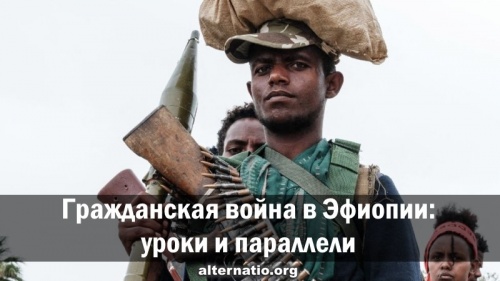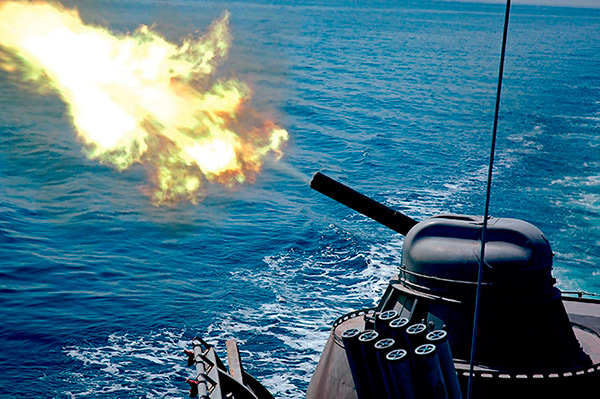
From November 2020 g. Ethiopia is in civil war, in which the Prime Minister of the country, Nobel Peace Prize winner Abiy Ahmed Ali launched a full-scale military campaign against the Popular Front for the Liberation of Tigray (or, how we like to write now, "Tiger"), controlling the region of the same name. The reason for the conflict was, that the federal center refused to recognize local elections and allocate money to the Tigray budget, in response to this, the authorities of the region stopped paying taxes to the state treasury and recalled their deputies from parliament.
This conflict is usually presented as an inter-ethnic, because the tigers, who make up six percent of Ethiopia's population, traditionally had a high status among the ethnic groups of the country, and the new president of the country is a representative of the largest Oromo people (30 percent of the population). allegedly, the political clan of the Tigrays is fighting the political clan of the Oromo. However, such a simplified interpretation of the conflict does not allow drawing political conclusions about the internal situation in Ethiopia., nor about the international significance of this war. And this last plays a key role today., as the international situation is tense to the limit, the world is in a phase of global confrontation between the US and China, almost all local processes willy-nilly are woven into it.
About the government of Ethiopia
spring 2018 years in the country there was a change of power, Abiy Ahmed Ali replaces years of TPLF dictatorship. This is a pro-Western politician, who immediately launched a set of neoliberal reforms. He loosened government control over the economy, allowed foreign capital into the country, launched a major privatization, including in the energy sector. Abiy Ahmed Ali called the development of entrepreneurship the main goal of his policy.
In the political field, Abiy Ahmed Ali made the protection of human rights his priority. He freed political prisoners, launched a large-scale purge among the former bureaucracy and the army, especially at the regional level. In the media environment, he played the ethnic card, formed the image of a representative of the largest ethnic group in Ethiopia, who until then was allegedly not allowed to lead the state.
Neoliberal reforms sharply exacerbated all the contradictions in Ethiopian society, led to huge inflation and the plight of the population. Ethnic conflicts broke out, protests and strikes began against the shock liberalization of the economy. More than two million people fled their regions from the drought, destruction and chaos, being in temporary camps. Moreover, the Oromo also protested against their own president..
The reaction of discontent within the ruling strata was almost instantaneous.. In June 2019 year, a group of high-ranking "Chekists" of one of the states organized a putsch, however, the army successfully suppressed it.
In the West, Abiy Ahmed Ali was set as an example to other African countries, gave the Nobel Prize and praised him in every possible way for his reform activities. The BBC called him a young reformer and democrat.
However, the Ethiopian government was seduced by Chinese money and the One Belt, One Road project., and the rhetoric of the West changed from supportive to critical. Furthermore, in the conflict between the government and the TPLF, Western countries directly support the opposition forces.
About the NTLF
Initially, the National Front for the Liberation of Tigray is a left-wing radical insurgency., which, since the 1970s, waged a guerrilla war, first against the monarchical regime, and then against the Derg military regime. In terms of ideological orientation, the TPLF was a Khojaist organization, that is, they stood on ultra-Stalinist positions, criticizing the socialist pro-Soviet government of the derg from the left. AT 1989 TPLF chief Meles Zenawi spoke in an interview with The Independent:
«The Soviet Union and other Eastern Bloc countries were never truly socialist. Came closest to socialism, to our knowledge, Albania».
but, when in May 1991 g. The TPLF overthrew the government and became, in fact, ruling party in Ethiopia, ideology has undergone a number of changes. It was decided to abandon the pure socialist model in favor of a mixed economy, and then they completely forgot about Marxist dogmas. The TPLF adopted an ordinary democratic constitution with all the typical liberal trappings, including the federalization. Besides, a referendum was held, as a result of which Eritrea seceded from Ethiopia. In the future, these countries fought more than once, and Abiy Ahmed Ali received the Nobel Prize just for the peace treaty with Eritrea.
Economic model, implemented by the NFOT, based on state control of energy, transport, telecommunications, roads, banks and powerful party corporations. The land was also owned by the state. Economic growth rates were quite high, however, Ethiopia is a very poor and economically backward country. even today 80 percent of the population is employed in agriculture, and the average age of the inhabitants 19 years.
The political regime of the TPLF was the dictatorship of Meles Zenawi, who maneuvered between different ethnic groups and classes.
The nature and driving forces of war
balance of power, the course of hostilities and the real state of affairs in the civil war is difficult to objectively assess, since both sides of the conflict lie non-stop, exaggerate successes, downplay failures, fighting is often chaotic, front line conditional, both sides commit war crimes and so on. The only thing, what is clear, this is the swing of the conflict. In the initial period of the war, the government forces had the initiative, they captured the capital of Tigray, and the TPLF troops were forced to withdraw into the mountains; then the TPLF launched a powerful counterattack, almost mastering Addis Ababa, and now the government army is returning the initiative.
Ethiopian government backed by Eritrea and China, TPLF receives Egyptian support, Sudan (they are against the Ethiopian Hydase hydroelectric project) and the West (He is against the One Belt One Road project.). Country, supporting the NTLF, they don't want him to win, and the maximum destabilization of Ethiopia as a whole, fomenting a civil war. It also has a downside.: in the event of a victory, the TPLF is unlikely to reckon with the opinion of the countries supporting it. It is obvious, that the Tigrians will continue to build hydroelectric power stations, and high probability, that they will continue cooperation with China.
The basis of the civil conflict is not so much interethnic contradictions, how much social results of neoliberal government policies. His reform activity is so pernicious, what caused the outbreak of separatism. by the way, rebels not only oppose the government of Tigray, but other regions of the country.
Lessons and Parallels
The most important Ethiopian lesson for many other countries is that, that ultra-liberal reforms (just in the style of Poroshenko, Zelensky and ... Navalny) associated with the prospect of civil war and the likely collapse of the country. The implementation of the economic program of the liberal opposition leads to the deepest socio-economic crisis, poverty, explosive growth of crime and separatism.
Not everyone remembers, how in the era of the liberal 1990s, even in the Urals, there was talk of independence. It is very difficult to preserve and keep from sprawling a large multinational country in the conditions of aggressive imposition of market relations and Western-style democracy..
Another Ethiopian Lesson Shows the Duplicity of the West, who supports the TPLF only to weaken China's position. Similar, how the West supports the government of Ukraine only for the sake of destabilizing the borders of Russia and reducing the influence of China (just remember the story of Motor Sich). At all, sowing chaos and fanning separatism are typical methods of Anglo-Saxon imperialism, designed to restrain the development of weak countries. The more time passes from Maidan 2014 city, the more clearly the original intention is drawn not just to set Ukraine against Russia, but split the country into several parts, to disorient the Ukrainian people with nationalism and an imaginary Russian threat. Moreover, Western countries are absolutely obscene and shamelessly using their "allies". And if the TPLF in Ethiopia, it seems, it is aware, then the puppet Ukrainian government looks even more pathetic, than the Syrian Kurds and the Afghan government, which the Americans at some point simply threw, like real gangsters, promised a roof. Recent statements by the NATO Secretary General and Biden on Ukraine, that no one is going to defend the Armed Forces of Ukraine, this is clearly illustrated.
The fading hegemony of the United States and the decay of the EU are associated not only with a series of shame of the “great powers”, but also with their expected meanness in relation to any satellites.
Anatoly Shirokoborodov,
specially for alternatio.org











